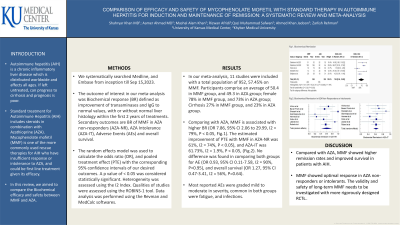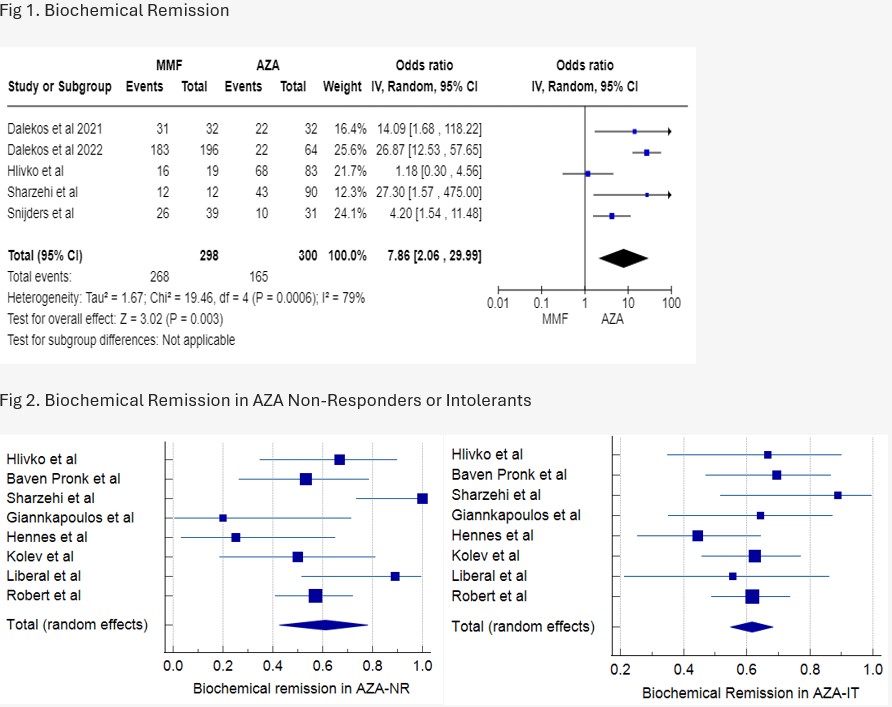Monday Poster Session
Category: Liver
P2973 - Comparison of Efficacy and Safety of Mycophenolate Mofetil With Standard Therapy in Autoimmune Hepatitis for Induction and Maintenance of Remission: A Systematic Review and Meta-Analysis
Monday, October 28, 2024
10:30 AM - 4:00 PM ET
Location: Exhibit Hall E

Has Audio
- SK
Shahryar Khan, MD
University of Kansas
Overland Park, KS
Presenting Author(s)
Shahryar Khan, MD1, Aamer Ahmad, MBBS2, Mashal Alam Khan, MBBS3, Rizwan Afridi, 4, Qazi Muhammad Safwan, MBBS5, Ahmed Khan Jadoon, MD6, Zarlish Rehman, MBBS7
1University of Kansas, Overland Park, KS; 2Khyber Medical University, Peshawar, North-West Frontier, Pakistan; 3Khyber Medical University, Overland Park, KS; 4Khyber Medical College, Peshawar, North-West Frontier, Pakistan; 5Khyber Medical College, Philadelphia, PA; 6The Aga Khan University Hospital, Karachi City, Sindh, Pakistan; 7Hayatabad Medical Complex, Peshawar, North-West Frontier, Pakistan
Introduction: Autoimmune hepatitis (AIH) is a chronic inflammatory liver disease which is distributed worldwide and affects all ages. If left untreated, can progress to cirrhosis and prognosis is poor. Standard treatment for Autoimmune Hepatitis (AIH) includes steroids in combination with Azathioprine (AZA). Mycophenolate mofetil (MMF) is one of the more commonly used rescue therapies for AIH who have insufficient response or intolerance to AZA, and could be first line treatment given its efficacy. In this review, we aimed to compare the Biochemical efficacy and safety between MMF and AZA.
Methods: We systematically searched Medline, and Embase from inception till Sep 15,2023. The outcome of interest in our meta-analysis was Biochemical response (BR) defined as improvement of transaminases and IgG to normal values, with or without normal liver histology within the first 2 years of treatments. Secondary outcomes are BR of MMF in AZA non-responders (AZA-NR), AZA Intolerance (AZA-IT), Adverse Events (AEs) and overall survival. The random effects model was used to calculate the odds ratio (OR), and pooled treatment effect (PTE) with the corresponding 95% confidence intervals of our desired outcomes. A p value of < 0.05 was considered statistically significant. Heterogeneity was assessed using the I2 Index. Qualities of studies were assessed using the ROBINS-1 tool. Data analysis was performed using the Revman and MedCalc softwares.
Results: In our meta-analysis, 11 studies were included with a total population of 952, 57.45% on MMF. Participants comprise an average of 50.4 in MMF group, and 49.3 in AZA group; female 78% in MMF group, and 73% in AZA group; Cirrhosis 27% in MMF group, and 23% in AZA group. Comparing with AZA, MMF is associated with higher BR (OR 7.86, 95% CI 2.06 to 29.99, I2 = 79%, P < 0.05, Fig.1). The estimated improvement of PTE with MMF in AZA-NR was 61%, I2 = 74%, P < 0.05), and AZA-IT was 61.73%, I2 = 1.9%, P < 0.05, (Fig.2). No difference was found in comparing both groups for AE (OR 0.93, 95% CI 0.11-7.58, I2 = 90%, P=0.95), and overall survival (OR 1.27, 95% CI 0.47-3.41, I2 = 56%, P=0.64). Most reported AEs were graded mild to moderate in severity, common in both groups were fatigue, and infections.
Discussion: Compared with AZA, MMF showed higher remission rates and improved survival in patients with AIH. MMF showed optimal response in AZA non-responders or intolerants. The validity and safety of long-term MMF needs to be investigated with more rigorously designed RCTs.

Disclosures:
Shahryar Khan, MD1, Aamer Ahmad, MBBS2, Mashal Alam Khan, MBBS3, Rizwan Afridi, 4, Qazi Muhammad Safwan, MBBS5, Ahmed Khan Jadoon, MD6, Zarlish Rehman, MBBS7. P2973 - Comparison of Efficacy and Safety of Mycophenolate Mofetil With Standard Therapy in Autoimmune Hepatitis for Induction and Maintenance of Remission: A Systematic Review and Meta-Analysis, ACG 2024 Annual Scientific Meeting Abstracts. Philadelphia, PA: American College of Gastroenterology.
1University of Kansas, Overland Park, KS; 2Khyber Medical University, Peshawar, North-West Frontier, Pakistan; 3Khyber Medical University, Overland Park, KS; 4Khyber Medical College, Peshawar, North-West Frontier, Pakistan; 5Khyber Medical College, Philadelphia, PA; 6The Aga Khan University Hospital, Karachi City, Sindh, Pakistan; 7Hayatabad Medical Complex, Peshawar, North-West Frontier, Pakistan
Introduction: Autoimmune hepatitis (AIH) is a chronic inflammatory liver disease which is distributed worldwide and affects all ages. If left untreated, can progress to cirrhosis and prognosis is poor. Standard treatment for Autoimmune Hepatitis (AIH) includes steroids in combination with Azathioprine (AZA). Mycophenolate mofetil (MMF) is one of the more commonly used rescue therapies for AIH who have insufficient response or intolerance to AZA, and could be first line treatment given its efficacy. In this review, we aimed to compare the Biochemical efficacy and safety between MMF and AZA.
Methods: We systematically searched Medline, and Embase from inception till Sep 15,2023. The outcome of interest in our meta-analysis was Biochemical response (BR) defined as improvement of transaminases and IgG to normal values, with or without normal liver histology within the first 2 years of treatments. Secondary outcomes are BR of MMF in AZA non-responders (AZA-NR), AZA Intolerance (AZA-IT), Adverse Events (AEs) and overall survival. The random effects model was used to calculate the odds ratio (OR), and pooled treatment effect (PTE) with the corresponding 95% confidence intervals of our desired outcomes. A p value of < 0.05 was considered statistically significant. Heterogeneity was assessed using the I2 Index. Qualities of studies were assessed using the ROBINS-1 tool. Data analysis was performed using the Revman and MedCalc softwares.
Results: In our meta-analysis, 11 studies were included with a total population of 952, 57.45% on MMF. Participants comprise an average of 50.4 in MMF group, and 49.3 in AZA group; female 78% in MMF group, and 73% in AZA group; Cirrhosis 27% in MMF group, and 23% in AZA group. Comparing with AZA, MMF is associated with higher BR (OR 7.86, 95% CI 2.06 to 29.99, I2 = 79%, P < 0.05, Fig.1). The estimated improvement of PTE with MMF in AZA-NR was 61%, I2 = 74%, P < 0.05), and AZA-IT was 61.73%, I2 = 1.9%, P < 0.05, (Fig.2). No difference was found in comparing both groups for AE (OR 0.93, 95% CI 0.11-7.58, I2 = 90%, P=0.95), and overall survival (OR 1.27, 95% CI 0.47-3.41, I2 = 56%, P=0.64). Most reported AEs were graded mild to moderate in severity, common in both groups were fatigue, and infections.
Discussion: Compared with AZA, MMF showed higher remission rates and improved survival in patients with AIH. MMF showed optimal response in AZA non-responders or intolerants. The validity and safety of long-term MMF needs to be investigated with more rigorously designed RCTs.

Figure: Forrest Plots. Fig.1 and Fig.2
Disclosures:
Shahryar Khan indicated no relevant financial relationships.
Aamer Ahmad indicated no relevant financial relationships.
Mashal Alam Khan indicated no relevant financial relationships.
Rizwan Afridi indicated no relevant financial relationships.
Qazi Muhammad Safwan indicated no relevant financial relationships.
Ahmed Khan Jadoon indicated no relevant financial relationships.
Zarlish Rehman indicated no relevant financial relationships.
Shahryar Khan, MD1, Aamer Ahmad, MBBS2, Mashal Alam Khan, MBBS3, Rizwan Afridi, 4, Qazi Muhammad Safwan, MBBS5, Ahmed Khan Jadoon, MD6, Zarlish Rehman, MBBS7. P2973 - Comparison of Efficacy and Safety of Mycophenolate Mofetil With Standard Therapy in Autoimmune Hepatitis for Induction and Maintenance of Remission: A Systematic Review and Meta-Analysis, ACG 2024 Annual Scientific Meeting Abstracts. Philadelphia, PA: American College of Gastroenterology.
